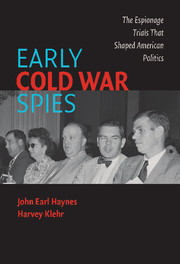Book contents
- Frontmatter
- Contents
- Series Editor's Foreword
- 1 Introduction: Early Cold War Spy Cases
- 2 The Precursors
- 3 Elizabeth Bentley: The Case of the Blond Spy Queen
- 4 The Alger Hiss–Whittaker Chambers Case
- 5 The Atomic Espionage Cases
- 6 Judith Coplon: The Spy Who Got Away with It
- 7 The Soble-Soblen Case: Last of the Early Cold War Spy Trials
- 8 Conclusion: The Decline of the Ideological Spy
- Index
- References
1 - Introduction: Early Cold War Spy Cases
Published online by Cambridge University Press: 05 June 2012
- Frontmatter
- Contents
- Series Editor's Foreword
- 1 Introduction: Early Cold War Spy Cases
- 2 The Precursors
- 3 Elizabeth Bentley: The Case of the Blond Spy Queen
- 4 The Alger Hiss–Whittaker Chambers Case
- 5 The Atomic Espionage Cases
- 6 Judith Coplon: The Spy Who Got Away with It
- 7 The Soble-Soblen Case: Last of the Early Cold War Spy Trials
- 8 Conclusion: The Decline of the Ideological Spy
- Index
- References
Summary
At the height of the early cold war, in the late 1940s and early 1950s, newspaper headlines repeatedly trumpeted the exposure of yet another nest of Communist spies or saboteurs who had infiltrated American laboratories or labor unions or government agencies. Many Americans worried that a Communist “fifth column,” more loyal to the Soviet Union than to the United States, had burrowed into their institutions and had to be exposed and removed.
The issue of Soviet espionage became a U.S. obsession, and domestic security dominated public discourse. Legislative committees vied with one another to expose Communists. The executive branch labored to root out disloyal government employees. The courts wrestled with the balance between constitutional rights and societal self-protection. The trade-union movement expelled from its ranks those unions with hidden Communist leadership. Liberalism, the dominant political movement of the era, fought an internal civil war over whether Communists were legitimate participants in the New Deal coalition, a struggle that ended with the triumph of anti-Communist liberalism and the assignment of Communists and their allies to the fringes of politics.
There was a widespread consensus that Soviet espionage was a serious problem, American Communists assisted the Soviets, and some high officials had betrayed the United States. But in the 1960s this consensus disintegrated. The use of anticommunism for partisan purposes by Senator Joseph McCarthy in the 1950s produced a backlash of incredulity about the extent of the domestic Communist problem.
- Type
- Chapter
- Information
- Early Cold War SpiesThe Espionage Trials that Shaped American Politics, pp. 1 - 22Publisher: Cambridge University PressPrint publication year: 2006

